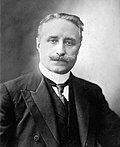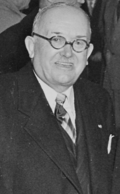User talk:P. S. Burton/Tunisia
Appearance
Maps to use?
[edit]Images to use?
[edit]People
[edit]Tunisian
[edit]Beys of Tunis (17051859-1956)
[edit]| Picture | Name | Born-Died | Reign start | Reign end |
|---|---|---|---|---|
 |
Muhammad III as-Sadiq | 1813 - 1882 | 22 September 1859 | 27 October 1882 |
 |
Ali Muddat ibn al-Husayn | 1817 – 1902 | 28 October 1882 | 11 June 1902 |
 |
Muhammad IV al-Hadi | 1855 - 1906 | 11 June 1902 | 11 May 1906 |
| File:Naceur Bey - 2.jpg | Muhammad V an-Nasir | 1855 – 1922 | 11 May 1906 | 10 July 1922 |
| File:Habib Bey - 2.jpg | Muhammad VI al-Habib | 1858 - 1929 | 10 July 1922 | 11 February 1929 |
| File:Ahmed Bey.jpg | Ahmad II ibn Ali | 1862 - 1942 | 11 February 1929 | 19 June 1942 |
 |
Muhammad VII al-Munsif | 1881 - 1948 | 19 June 1942 | 15 May 1943 |
| File:Lamine Bey.jpg | Muhammad VIII al-Amin | 1881 - 1962 | 15 May 1943 | 20 March 1956 |
French
[edit]Third French Republic (1870-1940)
[edit]President of the Government of National Defense
[edit]- Louis Jules Trochu (4 September 1870 - 13 February 1871)
Presidents of the National Constituent Assembly
[edit]- Denis Emmanuel, comte Benoist d'Azy (acting) (13 February 1871 - 16 February 1871)
- Jules Grévy (16 February 1871 - 17 February 1871)
Chief of the Executive Power
[edit]- Adolphe Thiers (17 February 1871-30 August 1871) (became President on 31 August)
Presidents
[edit]| # | Picture | Name | Term start | Term end | Political Party |
|---|---|---|---|---|---|
| 2 |  |
Adolphe Thiers[1] | 31 August 1871 | 24 May 1873 | Opportunist Republican |
| Initially a moderate monarchist, named President following the adoption of the Rivet law. He became a Republican during his term, and resigned in the face of hostility from the Assemblée nationale, largely in favour of a return to monarchy. | |||||
| 3 |  |
Patrice de Mac-Mahon[2] | 24 May 1873 | 30 January 1879 | Legitimist |
| A Marshal of France, he was the only monarchist President of the Third Republic. He resigned shortly after the Republican victory in the 1877 legislative elections, following his decision to dissolve the Chamber of Deputies. | |||||
| 4 |  |
Jules Grévy[3] | 30 January 1879 | 2 December 1887 | Opportunist Republican |
| The first President to complete a full term, he was eaily re-elected in December 1885. He was nonetheless forced to resign, following an honours scandal in which his son-in-law was implicated. | |||||
| 5 |  |
Marie François Sadi Carnot[4] | 3 December 1887 | 25 June 1894 | Opportunist Republican |
| His term was marked by boulangist unrest and the Panama scandals, and by diplomacy with Russia. Assassinated (stabbed) by Sante Geronimo Caserio a few months before the end of his mandate, he is interred at the Panthéon, Paris. | |||||
| 6 |  |
Jean Casimir-Perier[5] | 27 June 1894 | 16 January 1895 | Opportunist Republican |
| Perier's was the shortest Presidential term: he resigned after six months and 20 days. | |||||
| 7 |  |
Félix Faure[6] | 17 January 1895 | 16 February 1899 | Opportunist Republican |
| Pursued colonial expansion and ties with Russia. President during the Dreyfus Affair. Four years into his term he died of apoplexy at the Élysée Palace, allegedly in flagrante. | |||||
| 8 |  |
Émile Loubet[7] | 18 February 1899 | 18 February 1906 | Opportunist Republican |
| During his seven-year term, the 1905 French law on the Separation of the Churches and the State was adopted, and only four Presidents of the Council succeeded to the Hôtel Matignon. He did not seek re-election at the end of his term. | |||||
| 9 |  |
Armand Fallières[8] | 18 February 1906 | 18 February 1913 | ARD-PRD |
| President during the Agadir Crisis, when French troops first occupied Morocco. He was a party to the Triple Entente, which he strengthened by diplomacy. Like his predecessor, he did not seek re-election. | |||||
| 10 |  |
Raymond Poincaré[9] | 18 February 1913 | 18 February 1920 | PRD-ARD |
| President during World War I. He subsequently served as President of the Council 1922–1924 and 1926–1929. | |||||
| 11 |  |
Paul Deschanel[10] | 18 February 1920 | 21 September 1920 | ARD-PRDS |
| An intellectual elected to the Académie française, he overcame the popular Georges Clemenceau, to general surprise, in the January 1920 election. He resigned after eight months due to mental health problems. | |||||
| 12 |  |
Alexandre Millerand[11] | 23 September 1920 | 11 June 1924 | Independent |
| An "Independent Socialist" increasingly drawn to the right wing, he resigned after four years following the victory of the Cartel des Gauches in the 1924 legislative elections. | |||||
| 13 |  |
Gaston Doumergue[12] | 13 June 1924 | 13 June 1931 | Radical |
| The first Protestant President, he took a firm political stance against Germany and its resurgent nationalism. His seven-year term was marked by ministerial discontinuity. | |||||
| 14 |  |
Paul Doumer[13] | 13 June 1931 | 7 May 1932 | Radical |
| Elected in the second round of the 1931 election, having displaced the pacifist Aristide Briand. Assassinated (shot) by the mentally unstable Paul Gorguloff. | |||||
| 15 |  |
Albert Lebrun[14] | 10 May 1932 | 11 July 1940 | AD |
| Re-elected in 1939, his second term was interrupted de facto by the rise to power of Marshal Philippe Pétain. | |||||
Acting Presidents
[edit]Under the Third Republic, the President of the Council served as Acting President whenever the office of President was vacant.
- Jules Armand Dufaure (30 January 1879)
- Maurice Rouvier (2 December - 3 December 1887)
- Charles Dupuy (25 June - 27 June 1894, 16 January - 17 January 1895 and 16 February - 18 February 1899)
- Alexandre Millerand (21 September - 23 September 1920)
- Frédéric François-Marsal (11 June - 13 June 1924)
- André Tardieu (7 May - 10 May 1932)
Fourth French Republic (1947-1958)
[edit]Presidents
[edit]| # | Picture | Name | Term start | Term end | Political Party |
|---|---|---|---|---|---|
| 16 |  |
Vincent Auriol[15] | 16 January 1947 | 16 January 1954 | French Section of the Workers' International |
| First President of the Fourth Republic, his term was marked by the First Indochina War. | |||||
| 17 |  |
René Coty[16] | 16 January 1954 | 8 January 1959 | National Centre of Independents and Peasants |
| Presidency marked by the Algerian War; appealed to Charles de Gaulle to resolve the May 1958 crisis. Following the promulgation of the Fifth Republic, he resigned after five years as President, giving way to de Gaulle. | |||||
Other
[edit]See also
[edit]- ^ "Adolphe Thiers (1797–1877)" (in French). Official website of the French Presidency. Retrieved 2010-08-02.
- ^ "Patrice de Mac-Mahon (1808–1893)" (in French). Official website of the French Presidency. Retrieved 2010-08-02.
- ^ "Jules Grévy (1807–1891)" (in French). Official website of the French Presidency. Retrieved 2010-08-02.
- ^ "Marie-François-Sadi Carnot (1837–1894)" (in French). Official website of the French Presidency. Retrieved 2010-08-02.
- ^ "Jean Casimir-Perier (1847–1907)" (in French). Official website of the French Presidency. Retrieved 2010-08-02.
- ^ "Félix Faure (1841–1899)" (in French). Official website of the French Presidency. Retrieved 2010-08-02.
- ^ "Emile Loubet (1836–1929)" (in French). Official website of the French Presidency. Retrieved 2010-08-02.
- ^ "Armand Fallières (1841–1931)" (in French). Official website of the French Presidency. Retrieved 2010-08-02.
- ^ "Raymond Poincaré (1860–1934)" (in French). Official website of the French Presidency. Retrieved 2010-08-02.
- ^ "Paul Deschanel (1855–1922)" (in French). Official website of the French Presidency. Retrieved 2010-08-02.
- ^ "Alexandre Millerand (1859–1943)" (in French). Official website of the French Presidency. Retrieved 2010-08-02.
- ^ "Gaston Doumergue (1863–1937)" (in French). Official website of the French Presidency. Retrieved 2010-08-02.
- ^ "Paul Doumer (1857–1932)" (in French). Official website of the French Presidency. Retrieved 2010-08-02.
- ^ "Albert Lebrun (1871–1950)" (in French). Official website of the French Presidency. Retrieved 2010-08-02.
- ^ "Vincent Auriol (1884–1966)" (in French). Official website of the French Presidency. Retrieved 2010-08-02.
- ^ "René Coty (1882–1962)" (in French). Official website of the French Presidency. Retrieved 2010-08-02.


